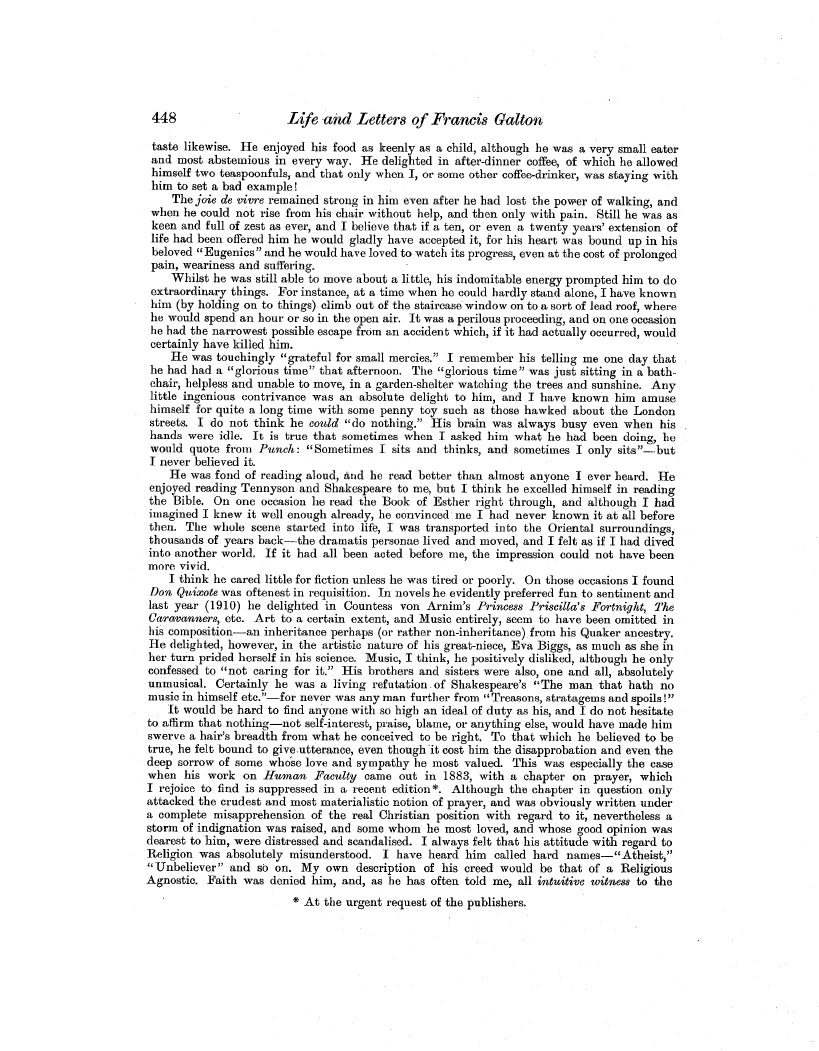| ||||||

OCR Rendition - approximate
448 Life -and Letters of Francis Galton taste likewise. He enjoyed his food as keenly as a child, although he was a very small eater and most abstemious in every way. He delighted in after-dinner coffee, of which he allowed himself two teaspoonfuls, and that only when I, or some other coffee-drinker, was staying with him to set a bad example ! The joie de vivre remained strong in him even after he had lost the power of walking, and when he could not rise from his chair without help, and then only with pain. Still he was as keen and full of zest as ever, and I believe that if a ten, or even a twenty years' extension of life had been offered him he would gladly have accepted it, for his heart was bound up in his beloved "Eugenics" and he would have loved to watch its progress, even at the cost of prolonged pain, weariness and suffering. Whilst he was still able to move about a little, his indomitable energy prompted him to do extraordinary things. For instance, at a time when he could hardly stand alone, I have known him (by holding on to things)) climb out of the staircase window on to a sort of lead roof, where he would spend an hour or so in the open air. It was a perilous proceeding, and on one occasion he had the narrowest possible escape from an accident which, if it had actually occurred, would certainly have killed him. He was touchingly "grateful for small mercies." I remember his telling me one day that he had had a "glorious time" that afternoon. The "glorious time" was just sitting in a bathchair, helpless and unable to move, in a garden-shelter watching the trees and sunshine. Any little ingenious contrivance was an absolute delight to him, and I have known him amuse himself for quite a long time with some penny toy such as those hawked about the London streets. I do not think he could "do nothing." His brain was always busy even when his hands were idle. It is true that sometimes when I asked him what he had been doing, he would quote from Punch: "Sometimes I sits and thinks, and sometimes I only sits"-but I never believed it. He was fond of reading aloud, and he read better than almost anyone I ever heard. He enjoyed reading Tennyson and Shakespeare to me, but I think he excelled himself in reading the Bible. On one occasion he read the Book of Esther right through, and although I had imagined I knew it well enough already, he convinced me I had never known it at all before then. The whole scene started into life, I was transported into the Oriental surroundings, thousands of years back-the dramatis personae lived and moved, and I felt as if I had dived into another world. If it had all been acted before me, the impression could not have been more vivid. I think he cared little for fiction unless he was tired or poorly. On those occasions I found Don Quixote was oftenest in requisition. In novels he evidently preferred fun to sentiment and last year (1910) he delighted in Countess von Arninn's Princess Priscilla's Fortnight, The Caravanners, etc. Art to a certain extent, and Music entirely, seem to have been omitted in his composition-an inheritance perhaps (or rather non-inheritance) from his Quaker ancestry. He delighted, however, in the artistic nature of his great-niece, Eva Biggs, as much as she in her turn prided herself in his science. Music, I think, he positively disliked, although he only confessed to "not caring for it." His brothers and sisters were also, one and all, absolutely unmusical. Certainly he was a living refutation -of Shakespeare's "The man that bath no music in himself etc."-for never was any man further from "Treasons, stratagems and spoils!" It would be hard to find anyone with so high an ideal of duty as his, and I do not hesitate to affirm that nothing-not self-interest, praise, blame, or anything else, would have made him swerve a hair's breadth from what he conceived to be right. To that which he believed to be true, he felt bound to give-utterance, even though 'it cost him the disapprobation and even the deep sorrow of some whose love and sympathy he most valued. This was especially the case when his work on Human Faculty came out in 1883, with a chapter on prayer, which I rejoice to find is suppressed in a recent edition*. Although the chapter in question only attacked the crudest and most materialistic notion of prayer, and was obviously written under a complete misapprehension of the real Christian position with regard to it, nevertheless a storm of indignation was raised, and some whom he most loved, and whose good opinion was dearest to him, were distressed and scandalised. I always felt that his attitude with regard to Religion was absolutely misunderstood. I have heard him called hard names-"Atheist," "Unbeliever" and so on. My own description of his creed would be that of a Religious Agnostic. Faith was denied him, and, as he has often told me, all intuitive witness to the * At the urgent request of the publishers.
|